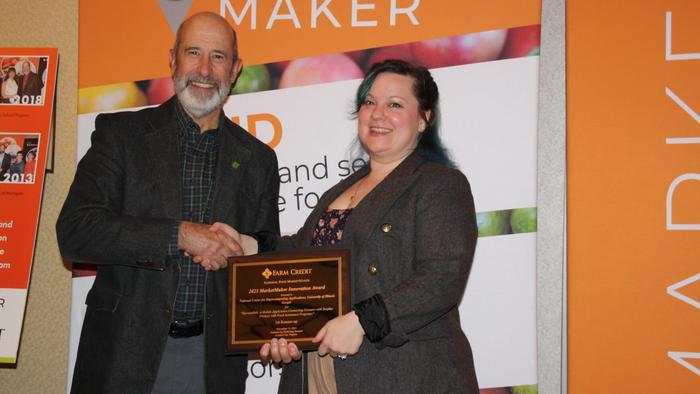The COVID-19 pandemic infiltrated almost every aspect of society and life in 2020, even in ways people wouldn’t have immediately expected. Stores that typically have no problem stocking shelves were struggling to keep pace with the sudden demand for cleaning supplies along with everything from toilet paper to Sriracha chili sauce.

Credit: NCSA
The COVID-19 pandemic infiltrated almost every aspect of society and life in 2020, even in ways people wouldn’t have immediately expected. Stores that typically have no problem stocking shelves were struggling to keep pace with the sudden demand for cleaning supplies along with everything from toilet paper to Sriracha chili sauce.
While these issues aren’t as devastating as the larger health ramifications, they did shed new light on supply chain weaknesses and how that system adapts to rapid and vast market shifts. Factory closures and reduced production, increased demand for specific types of goods, labor shortages and transportation hurdles were just some of the many obstacles manufacturers faced in trying to get goods into the the hands of consumers during one of the most-challenging times in global history.
These supply chain problems underscored the importance of building more resilient, flexible and diversified strategies to better withstand unforeseen disruptions.
HarvestHub, a mobile application developed by a team at the National Center for Supercomputing Applications within the Center for Digital Agriculture, will heal COVID-damaged supply chains, help farmers increase production and get food to families in need. The app was recognized at the Farm Credit MarketMaker Innovation Awards ceremony during the 2023 National Agricultural Marketing Summit in Arlington, VA, which awarded outstanding efforts by state and local MarketMaker collaborations around the country that contribute to the development of local and regional food systems and help farmers connect to new market opportunities.
In collaboration with Google and MarketMaker, NCSA helped develop HarvestHub to make it easier for farmers to donate or sell surplus products to local food assistance programs. The app will serve as a tool to support a Farm Bureau-led “Farm to Food Bank” pilot in Illinois and ultimately for all MarketMaker affiliated partners.
“Our team designed HarvestHub to work as a tool to assist with the complex food security landscape,” said NCSA Genomics Lead Christina Fliege. “By connecting consumers and producers directly to each other, we allow them to make these negotiations directly to streamline this process.”
With HarvestHub, food producers can move their seconds and surplus at a price they set. Food assistance programs – ranging from major food banks to soup kitchens, pantries and more – can coordinate directly with them.
The NCSA team interviewed farmers and food bank representatives to discuss the initial parameters of the app to make sure the functionality was useful to all interested parties.
We use a bottom-up approach where we work closely with users – in this case, community members – to understand their day-to-day lives, the pain points they encounter and their needs not addressed by the current system. We continue working with community members throughout the entire design and development process, gathering feedback and integrating it into the digital product.
Jessica Saw, NCSA Research Scientist
While the recognition is certainly a worthwhile acknowledgement of the team’s effort, Fliege is mostly focused on the potential impact HarvestHub could have on local communities and beyond.”
“It was super exciting receiving the innovation award and getting to learn about the other finalists and their projects,” Fliege said. “There’s a lot of really cool work being done in this space right now. We’re all extremely grateful that our work was recognized, and very excited to see its potential impact come to fruition – pun intended.”
Read more about HarvestHub and all of the projects recognized in the Farm Credit MarketMaker Innovation awards here.
ABOUT CENTER FOR DIGITAL AGRICULTURE
The Center for Digital Agriculture (CDA) draws on Illinois’ historic land-grant pillars of agriculture and engineering to shape the future of the agriculture industry. The center brings together researchers, educators, industry and agricultural producers to transform how we feed and support a growing global population through innovative approaches. CDA also boasts a Master’s of Engineering in Digital Agriculture and six certificate programs that address the profound workforce shortage in this field by providing graduates and working professionals with in-depth knowledge and technical skills. CDA is a multidisciplinary effort at the University of Illinois Urbana-Champaign between the Grainger College of Engineering, the College of Agricultural, Consumer and Environmental Sciences, the National Center for Supercomputing Applications and the Institute for Genomic Biology. CDA also leads the Artificial Intelligence for Future Agricultural Resilience, Management, and Sustainability (AIFARMS) Institute which is supported by the USDA National Institute of Food and Agriculture and the National Science Foundation.



